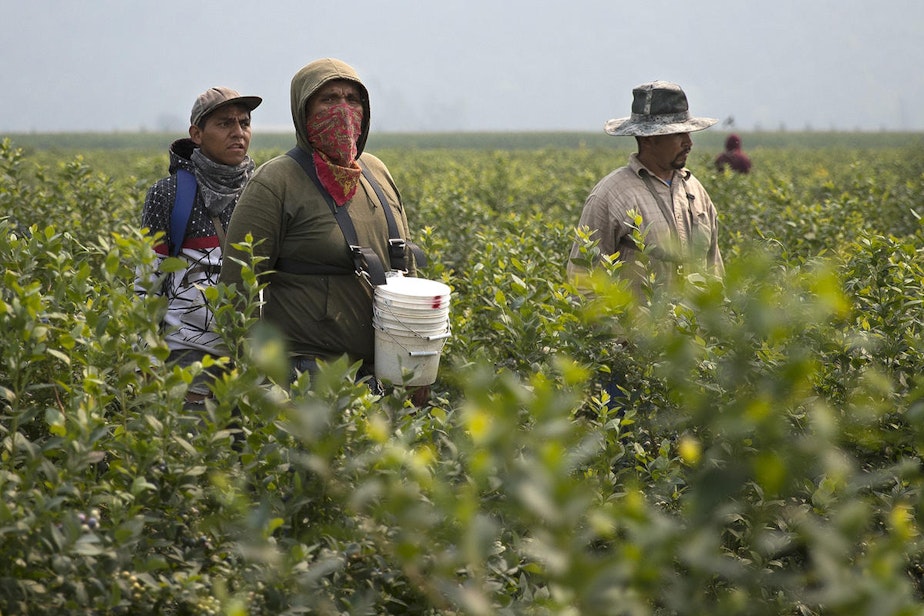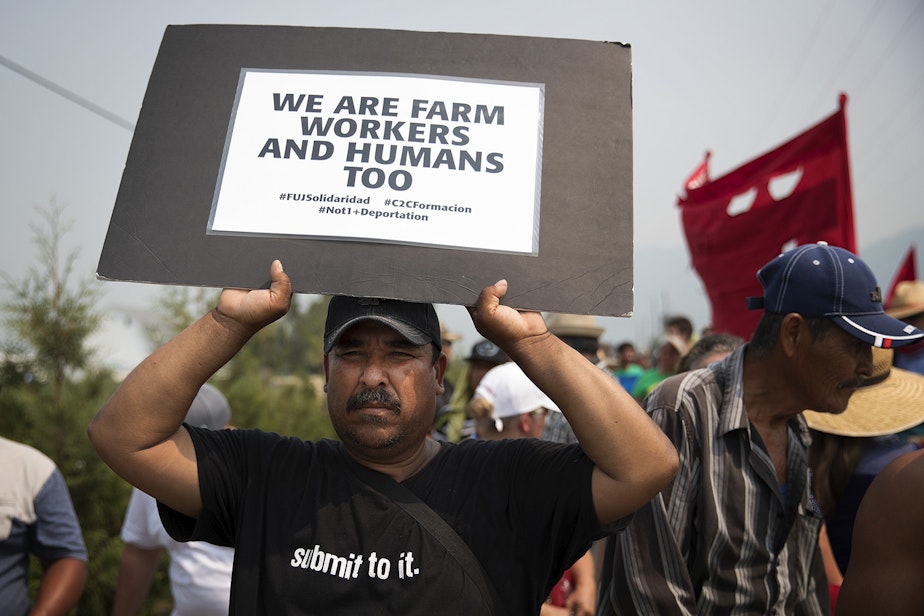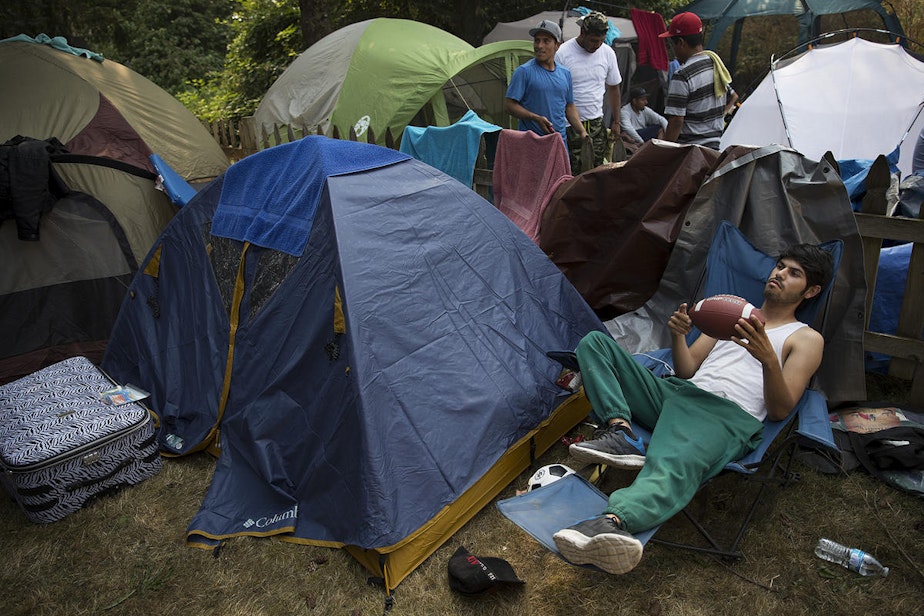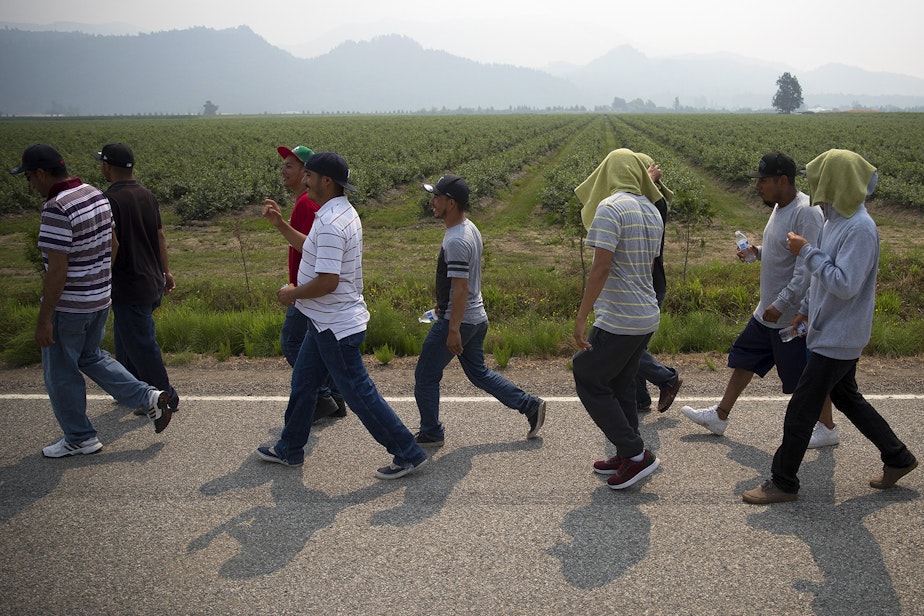They were ordered to work unless on their 'deathbed,' blueberry pickers claim

Supervisors at a sprawling blueberry farm in northern Washington state threatened and intimidated workers and ordered them to report for 12-hour shifts "unless they were on their death bed," according to a federal lawsuit filed Thursday.
One of the workers, Honesto Silva Ibarra, a 28-year-old father of three, died at a Seattle hospital on August 6.
The lawsuit, filed in Seattle, is brought by two workers employed at Sarbanand Farms in Sumas in 2017 and seeks a class-action status to represent more than 600 of their fellow workers.
The suit describes a ruthless, hostile workplace for Silva and other foreign workers.
The complaint alleges Sarbanand violated state and federal laws, including a law designed to protect workers against forced labor. According to the lawsuit, Sarbanand staff illegally threatened workers with termination or retaliation and created a hostile workplace that discriminated against the foreign laborers.
“These are serious allegations and likely the most serious I’ve ever made in 25 years of representing farmworkers in employment matters,” said Joe Morrison, an attorney with Columbia Legal Services, which is representing the workers.
A statement Thursday from the law firm representing Sarbanand, and it’s parent company Munger Brothers LLC, said “the companies will vigorously fight the allegations” and that “they are committed to the wellbeing of every one of their workers.” The statement describes operations at the Washington farm as “exemplary.”
State and federal investigations into Silva’s death and conditions at Sarbanand Farms are still ongoing.

'You came here to suffer, not for vacation'
During the summer of 2017, Sarbanand brought in 618 temporary workers from Mexico to help with the blueberry harvest on the sprawling farm on the boarder of Washington state and Canada. It was a season scarred by protest and death.
The two plaintiffs named in the lawsuit, Barbaro Rosas and Guadalupe Tapia, were among the workers Sarbanand contracted through the federal H-2A visa program. It allows employers to bring in foreign agricultural workers if there’s a seasonal labor shortage. The employer provides housing, transportation across the Mexican border and a fixed wage.
The lawsuit claims Sarbanand managers routinely threatened to send workers back to Mexico and blacklist them from future H-2A contracts if they did not pick two boxes of blueberries an hour or if they complained. The account states Sarbanand fired workers who got sick or injured but did not pay for their transportation home. In some cases, other workers donated money to help co-workers return home.
According to the lawsuit, Sarbanand provided meager meals, sometimes ran out of food and “used a colored ink marker to put an X on each foreign worker’s hand” to ensure they did not receive more than one portion. At one point, the lawsuit states, a Sarbanand manager told workers “you came here to suffer, not for vacation.”
Munger Farms, based in California, is one of the largest blueberry producers in North America. The company partners with Naturipe to sell berries at grocery chains nationwide, including Costco, Walmart and Whole Foods.
Washington is the leading state for blueberry production, and one of the top four states for the H-2A program, with more than 18,000 workers brought in last year. But the system has sparked controversy and lawsuits.
Rosalinda Guillen, a longtime farmworker advocate in Bellingham who helped support the Sarbanand workers last summer, said the H-2A program sets the stage for worker abuse and exploitation.
“The problem has always been that farmworkers are afraid to complain,” Guillen said.
But when Honesto Silva Ibarra fell ill, the workers became increasingly worried. Others had also experienced headaches and dizziness while they picked berries under a persistent cloud of smoke from nearby wildfires. After talks with management left them unsatisfied, the workers took a rare and rebellious step.

Workers protest draws attention
On August 4, Rosas and Tapia joined roughly 60 workers for a one-day strike at Sarbanand to call for better safety and health conditions. One of the striking workers called the U.S. Department of Labor for help and an investigator showed up at Sarbanand the same day. The day after, the company fired the 60 workers for insubordination and gave them one hour to gather their belongings and leave the property.
With nowhere to go, the workers waited at makeshift tent camp at a nearby farm for nearly two weeks while lawyers, advocates and government officials worked with Sarbanand to address the men’s grievances and arrange for their return home.
Joe Morrison, the workers' lawyer, said he's rarely seen so many government investigators descend on a farm the way they did during those days following the worker protest and Silva's death.
In an August 15 statement, Sabanand officials disputed many of the workers claims about health and safety issues at the farm, and defended the company’s practices.
“Our company makes every effort to comply with all regulatory requirements. The company conducts full orientation and worker safety meetings with all harvest workers as they arrive at the Sumas farm. Company policies encourage all employees to report illnesses, concerns and all other problems they may have. The company responds to all such requests in a reasonable and appropriate manner. We continue to hold regular meetings with workers almost daily to review these procedures.”

Morrison said the lawsuit seeks court orders for Sarbanand and Munger to adopt specific labor polices that will protect workers from threats, coercion and retaliation. He’s also hopeful this lawsuit will highlight some needed changes in the H-2A program and lead to increased oversight.
“What we need is a strong protective ombudsman program here that workers can call out and get problems solved and issues fixed early on so that they are not stuck in these abusive labor situations that may ultimately lead to someone’s death.”
The King County Medical Examiner determined Silva died of natural causes, due to complications related to diabetes. The Washington State Department of Labor and Industries is still investigating whether any workplace factors contributed to Silva’s death. The findings of that investigation are due in February.
The U.S. Department of Labor is also conducting a separate investigation into workplace practices. Sarbanand has said it is fully cooperating with all investigations.
The lawsuit also seeks damages for all plaintiffs in the class, including reimbursement for daily meals, lost wages and payment of $500 per person for each alleged violation of Washington’s Farm Labor Act.
“We’re hopeful that the lawsuit will bring about a measure of dignity to our clients who are suing the company,” Morrison said. “We also hope this will be a harbinger of future changes that will spark more protections for all farmworkers in Washington state.”

